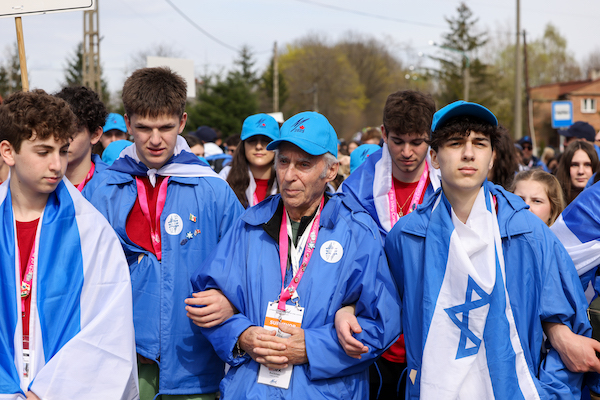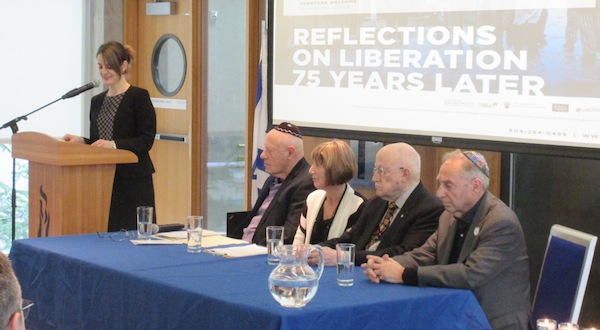Alex Buckman with students on the March of the Living. (photo from thecjn.ca)
Alex Buckman, a tireless stalwart for Holocaust education in British Columbia and a steadfast advocate for his fellow child survivors, died in Warsaw on April 21. He was 83. Buckman had been on a trip to Poland accompanying the Coast-to-Coast Canada March of the Living delegation.
Described by those who knew and worked with him as a caring and gentle person, Buckman was president of the Vancouver Child Survivors Group, served as treasurer of the World Federation of Jewish Holocaust Survivors & Descendants and had, in recent decades, spoken to thousands of students in the province through the Vancouver Holocaust Education Centre.
In his 2017 memoir Afraid of the Dark, Buckman wrote that he felt compelled to share his story as a Holocaust survivor for two reasons: “First, I want others to know the price of hate. Hate destroys the lives of innocent people. It breaks families apart and its effects are felt for a lifetime. Second, and most importantly, I share my story to honour the memory of my parents. Talking about our stories gives them a chance to live again and gives me the opportunity to remember them.”
Born in Brussels, Buckman was seven months old when Germany invaded Belgium on May 10, 1940. At age 2, his parents sent him into hiding, and he would find shelter in a dozen different non-Jewish homes over the course of the following two years.
Buckman was next handed over to Andrée Geulen, a 20-year-old teacher, for safekeeping. Geulen, who helped to save many other Jewish children during the Holocaust and was later named one of the Righteous Among the Nations, moved Buckman to an orphanage in the town of Namor.
Buckman’s parents would ultimately be sent to Auschwitz-Birkenau, where they perished.
Under the care of his aunt, Rebecca Teitelbaum (Aunt Becky), Buckman immigrated to Canada in 1951. They settled in Montreal. As a young man, Buckman got his first job as a cost accountant for the bakery and delicatessen at a Steinberg grocery store. He went on to attend night school before entering Sir George Williams University to obtain a degree in accounting.
In 1962, he married Colette Roy, and they embarked on what he called a “normal life.” Their son Patrick was born in 1964 and, in 1967, he took his family west to Vancouver, where Buckman found a job as a housing officer for the Canada Mortgage and Housing Corporation. The position entailed developing homes for Indigenous people across British Columbia.
“It felt so good helping people move into their own homes. It really changed their lives and I loved meeting and working with the First Nations bands. I felt connected to them,” Buckman would write.
Concurrently, he developed an interest in running, competing in both half and full marathons.
Buckman had made a previous excursion to Poland to join the March of the Living in 2010, which he described as one of the “most meaningful” trips of his life. Speaking to the students traveling with him at that time, he reflected, “What will happen when we will go home? How will we deal with injustice? How will we continue to do all the things we have to do? How will you continue the legacy? How will you remember? I know I will remember you always. We spent a week in Poland together. I don’t think I would have made if it wouldn’t be for you. Some people tell me I was there for them – but most of you were there for me.”
He would further ruminate on that trip to Poland in his memoir, writing: “We Holocaust survivors, accompanied by students from around the world, silently walked the three kilometres that separate Auschwitz from Birkenau in tribute to all the innocent lives that were ended there. I walked into the shower room/gas chamber where my mother once stood, her arms most likely tightly holding onto her sister, in 1943. I wept, surrounded by people who truly understood my loss.”
Prior to that trip, Buckman had avoided speaking about his mother’s experiences to, as he said, “protect the kids from the grim reality of the death camps” – not wanting to tell young people that up to 2,500 people were killed at a time in the gas chambers. “But after I had stood in her place, I decided her death deserved to be spoken about.”
During his talks to young people, Buckman would often share the story of the recipe book his aunt created in a dangerous and defiant act while a prisoner at the Ravensbrück concentration camp, where she held an office job at a Siemens factory.
As a means to keep her mind off the dire conditions at a concentration camp, Rebecca Teitelbaum would reminisce about the family meals she prepared before the war. One evening while working at Siemens, she found some brown paper that she concealed in her dress. Later, after stealing a pencil and scissors, she went to her barracks and started cutting the paper into the little squares onto which she would write her recipes.
Buckman held on to the recipe book and, at his speaking engagements, he would leave his young audience members with a copy of Aunt Becky’s gâteau à l’orange (orange cake). He would ask the students to invite their families to make the cake together and to share his story with their mothers, fathers and siblings.
As he detailed in the final section of his memoir, by bringing families together through the recipe and having them share his story, Buckman’s hope was to stop the spread of hate and honour the memory of his own family.
“As a group, we thrived in his care,” said Vancouver author and child survivor Lillian Boraks-Nemetz. “He was a great speaker and carried an important message to masses of students against hate, intolerance and bigotry. Alex is and will be missed by all. May his soul continue to watch over us. May he rest in peace knowing that he is loved.”
Buckman is survived by his wife Colette; son Patrick and his wife Elsi (née Towes); grandchildren Alexander, Jameson and Rachael; and sister Annie Kidorf. Patrick Buckman had accompanied his father to Poland for the March of the Living.
Sam Margolis has written for the Globe and Mail, the National Post, UPI and MSNBC. This obituary was originally published in the Canadian Jewish News, thecjn.ca.


